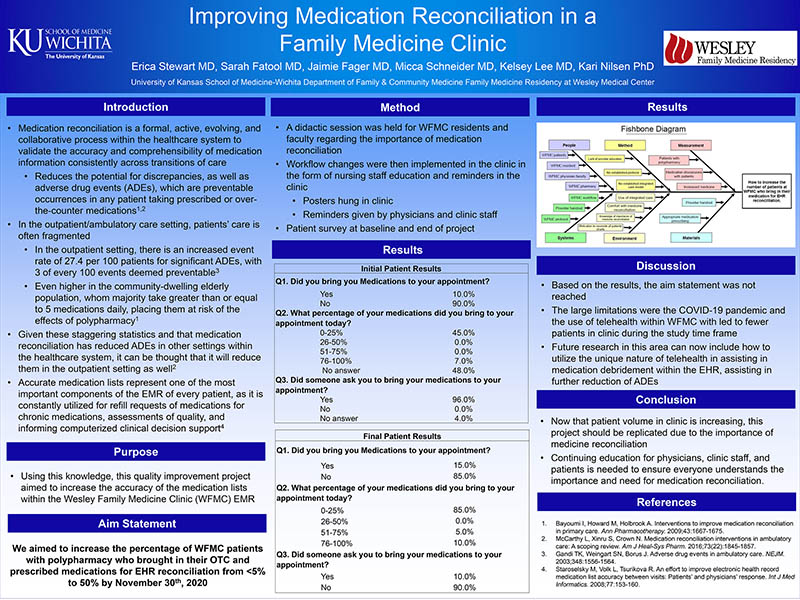
Hover to pan and click to magnify. Click again to pan at full screen.
Erica Stewart MD, Sarah Fatool MD, Jaimie Fager MD, Micca Schneider MD, Kelsey Lee MD, Kari Nilsen PhD
Erica Stewart MD, Sarah Fatool MD, Jaimie Fager MD, Micca Schneider MD, Kelsey Lee MD, Kari Nilsen PhD
University of Kansas School of Medicine-Wichita Department of Family & Community Medicine Family Medicine Residency at Wesley Medical Center
ABSTRACT
Medication reconciliation is a collaborative process within the healthcare system to validate the accuracy and comprehensibility of patients’ medication information consistently across settings. This process reduces the potential for medication discrepancies and reduces adverse drug events. Knowing the importance of an accurate medication reconciliation with patients, this project aimed to increase the accuracy of the medication lists within the EMR.
Baseline measurement was a survey of all patients in a 30-day period of time regarding their medication reconciliation.
Project ran from March to November 2020 and all patients over aged 18 received brief educational interventions regarding medicine reconciliation at each clinic appointment. Education for physicians and nursing staff regarding the importance of reminding patients to bring medication to appointments was also provided.
Small improvements in the number of patients bringing their medications to clinic appointments were shown after the intervention (10% vs. 15%); however, after the end of the intervention period fewer patients indicated they were reminded to bring their medications to appointments (96% vs. 10%).
A multitude of factors contribute to a lack of complete medication reconciliation, which creates the potential for error. Clinic workflows have not traditionally included a regular inventory of all medications a patient takes or verifying these lists with the patient. When health care information is not integrated across settings it is not easy to validate or fill in the gaps from patient-reported information. It requires the entire healthcare team to ensure patients understand the importance of medicine reconciliation and are reminded at each visit.

DISQUS COMMENTS WILL BE SHOWN ONLY WHEN YOUR SITE IS ONLINE